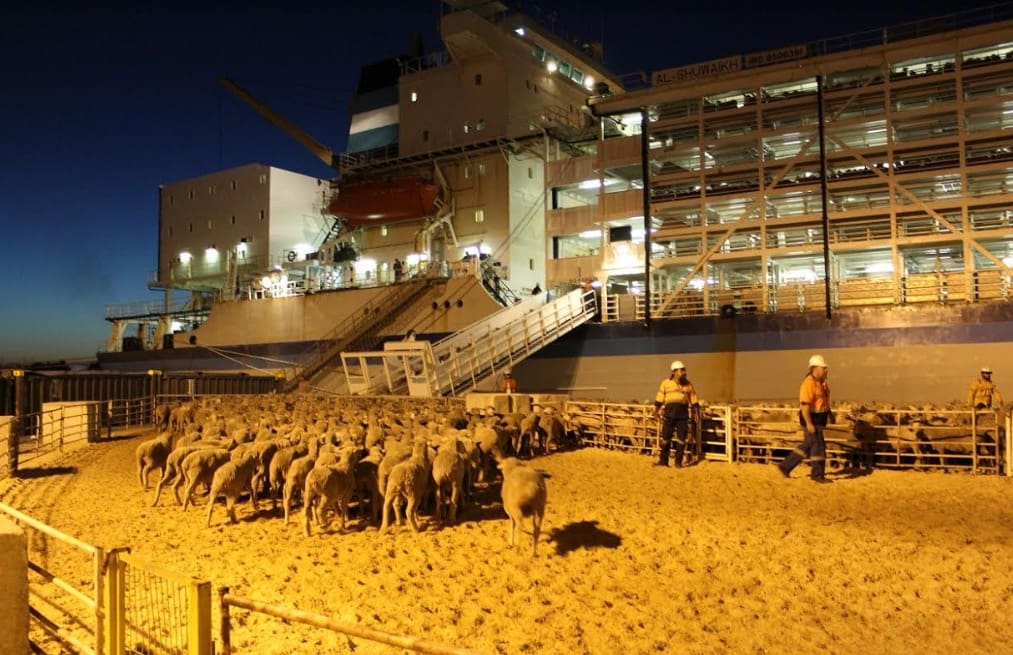
Loading sheep on the Al Shuwaikh in Adelaide last year.
MAJOR Middle East livestock importer Al Mawashi is among defendants to criminal charges laid in relation to a live sheep shipment from South Africa last month.
South Africa’s National Society for the Prevention of Cruelty to Animals has confirmed it has laid criminal charges over the live export of about 60,000 sheep on the Al Shuwaikh from the port of East London.
Al Mawashi trades out of Australia as the Kuwait Livestock Transport and Trading Company, and has been the largest importer of Australian sheep to the Middle East.
The Kuwait-based importer has been sourcing sheep from other countries – including South Africa, Romania and Somalia – to supplement Australian supply restrictions due to a Northern Hemisphere summer moratorium.
The NSCPA said its intention in bringing criminal charges over the Al Shuwaikh shipment is to ensure the vessel does not return to South Africa, but also to challenge the exporting of live animals by sea.
The NSPCA confirmed that criminal charges had been laid under South Africa’s Animals Protection Act No 71 of 1962. The charges were laid against the Department of Agriculture, Land Reform and Rural Development (DALRRD), Eastern Cape Rural Development and Agrarian Reform, Al Mawashi – the owners of the Al Shuwaikh vessel, the captain of the Al Shuwaikh, the Page Farming Trust and individuals from the Page Farming Trust.
In October 2019, despite a campaign by the NSPCA against the live export of about 60,000 sheep to the Middle East, the South African Government approved the Al Shuwaikh shipment. The NSPCA monitored the loading process and claimed that contraventions under Animals Protection Act No 71 of 1962 were observed and documented by its inspectors and those from various Eastern Cape SPCAs.
The NSCPA said conditions on board the Al Shuwaikh included dangerously high ammonia levels on some of the enclosed decks, dirty conditions including faeces in the food and water troughs, and other serious welfare concerns. Animals were treated in an inhumane manner on the dock and feedlot, and attempts were made to load sick, injured and lame animals onto the vessel, the NSCPA has claimed.
NSPCA Farm Animal Protection Unit manager Grace De Lange said the NSPCA has received criticism that it has taken too long to lay the charges for animal cruelty.
“Preparing separate dockets for the feedlot, the harbour and the vessel carrying the sheep has involved the collation of valuable evidence from 15 staff members.
“Carefully completed dockets with the relevant evidence have been handed over to the South African Police Services who will now only be required to obtain statements from the accused.”
The NSPCA said its legal counsel has confirmed is has a case for South Africa’s High Court. The NSPCA believes that live export by sea is completely unacceptable and unnecessary.
Al Mawashi chief executive officer Osama Boodai said last month the company had evidence to refute any NSCPA claims of animal cruelty. He said the company was looking at another South African consignment of 70,000 sheep and 1000 cattle, most probably in early 2020.
Live export under fire worldwide
The South African charges come as two former directors of the live export company and KLTT trading partner Emanuel Exports are preparing to fight animal cruelty charges relating to a Middle East voyage of the Awassi Express from Australia on which about 2400 sheep died.
Former Emanuel Exports managing director Graham Daws and ex-director Michael Stanton have pleaded not guilty to animal cruelty charges brought by Western Australia’s Department of Primary Industries and Regional Development under the state’s Animal Welfare Act. The two former directors have entered pleas of not guilty in Perth Magistrates Court and the case will return to court on January 17 next year.
In the Black Sea off the coast of Romania, efforts are being made to save 14,600 sheep on a Saudi Arabia-bound vessel, Queen Hind, which has capsized this week. The incident has renewed calls by the New Zealand animal welfare group SAFE to ban all live exports.
The live export of cattle, sheep, goats and deer for slaughter was banned from New Zealand in 2003, but it is still legal to export the animals for breeding purposes. The live export trade is currently under review by the Ministry for Primary Industries, which is considering a conditional ban on the live export of cattle.



HAVE YOUR SAY